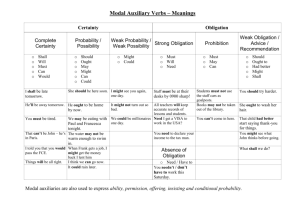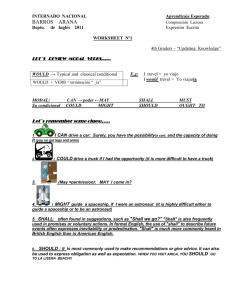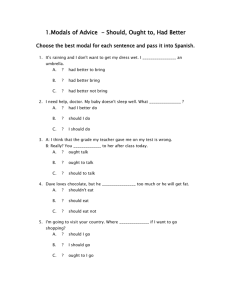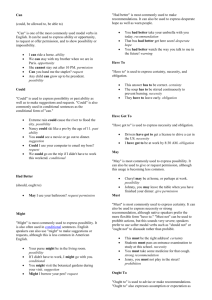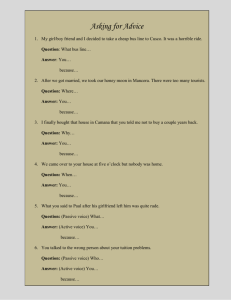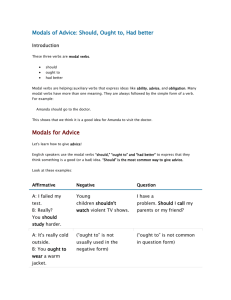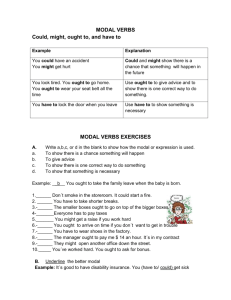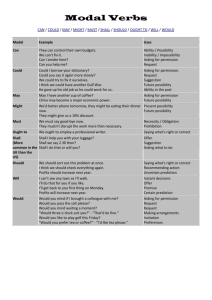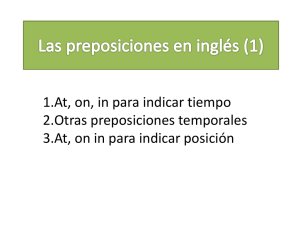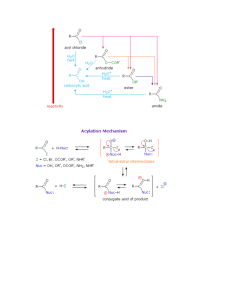"GET" y "GOT" El problema con "get" (pasado/participio: "got") es
advertisement
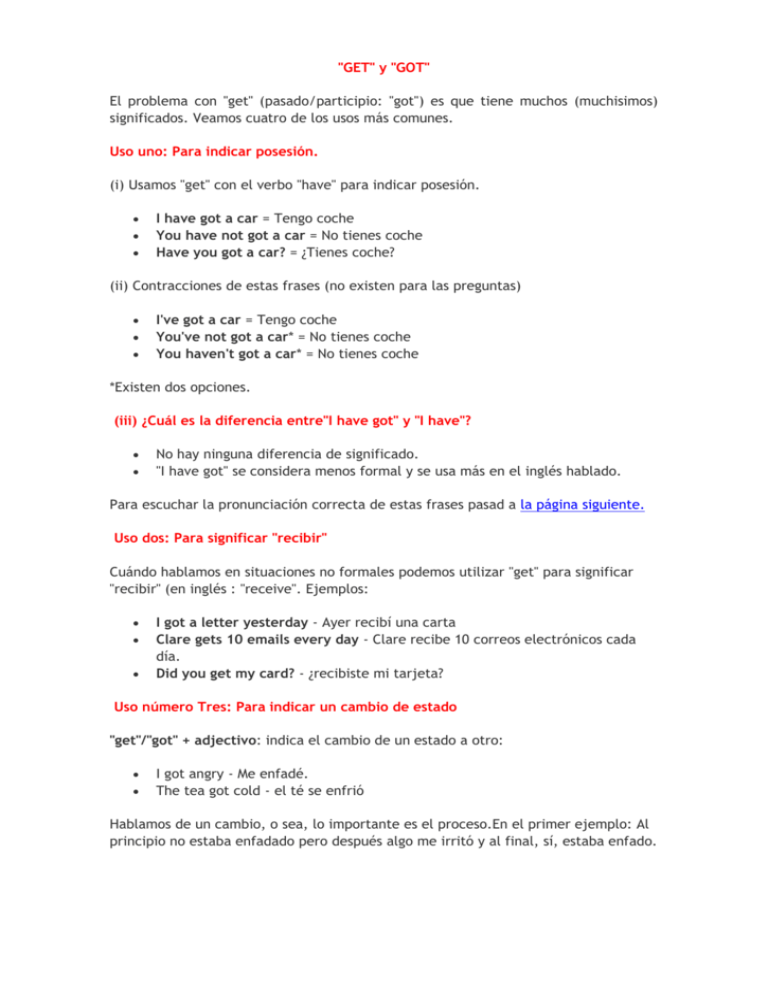
"GET" y "GOT" El problema con "get" (pasado/participio: "got") es que tiene muchos (muchisimos) significados. Veamos cuatro de los usos más comunes. Uso uno: Para indicar posesión. (i) Usamos "get" con el verbo "have" para indicar posesión. I have got a car = Tengo coche You have not got a car = No tienes coche Have you got a car? = ¿Tienes coche? (ii) Contracciones de estas frases (no existen para las preguntas) I've got a car = Tengo coche You've not got a car* = No tienes coche You haven't got a car* = No tienes coche *Existen dos opciones. (iii) ¿Cuál es la diferencia entre"I have got" y "I have"? No hay ninguna diferencia de significado. "I have got" se considera menos formal y se usa más en el inglés hablado. Para escuchar la pronunciación correcta de estas frases pasad a la página siguiente. Uso dos: Para significar "recibir" Cuándo hablamos en situaciones no formales podemos utilizar "get" para significar "recibir" (en inglés : "receive". Ejemplos: I got a letter yesterday - Ayer recibí una carta Clare gets 10 emails every day - Clare recibe 10 correos electrónicos cada día. Did you get my card? - ¿recibiste mi tarjeta? Uso número Tres: Para indicar un cambio de estado "get"/"got" + adjectivo: indica el cambio de un estado a otro: I got angry - Me enfadé. The tea got cold - el té se enfrió Hablamos de un cambio, o sea, lo importante es el proceso.En el primer ejemplo: Al principio no estaba enfadado pero después algo me irritó y al final, sí, estaba enfado. Podemos decir que "get"= proceso y "be"= estado: I was angry - Estaba enfadado. I got angry - Me enfadé. Uso número Cuatro: Ir> Coger una cosa > Traer Es mejor empezar con un ejemplo porque una traducción directa no ayudar a aclarar este uso de "get"... Imagínate que estás sentado en la mesa comiendo hamburguesas con unos amigos cuándo te das cuenta de que has dejado el ketchup en la cocina. Decides ir a la cocina, coger la botella y traerla a la mesa. Pues, en inglés decimos: I got the ketchup No hay una traducción directa al castellano, entonces es mejor pensar que aquí "get" es una combinación de tres acciones: IR + COGER + REGRESAR MODAL VERBS CAN & MAY "Can" is one of the most commonly used modal verbs in English. It can be used to express ability or opportunity, to request or offer permission, and to show possibility or impossibility. Examples: I can ride a horse. ABILITY We can stay with my brother when we are in Paris. OPPORTUNITY She cannot stay out after 10 PM. PERMISSION Can you hand me the stapler? REQUEST Any child can grow up to be president. POSSIBILITY "May" is most commonly used to express possibility. It can also be used to give or request permission, although this usage is becoming less common. Examples: Cheryl may be at home, or perhaps at work. POSSIBILITY Johnny, you may leave the table when you have finished your dinner. GIVE PERMISSION May I use your bathroom? REQUEST PERMISSION ***MAY AND CAN can be used to request or offer permission but MAY is more formal than CAN. COULD & SHOULD "Could" is used to express possibility or past ability as well as to make suggestions and requests. "Could" is also commonly used in conditional sentences as the conditional form of "can." Examples: Extreme rain could cause the river to flood the city. POSSIBILITY Nancy could ski like a pro by the age of 11. PAST ABILITY You could see a movie or go out to dinner. SUGGESTION Could I use your computer to email my boss? REQUEST We could go on the trip if I didn't have to work this weekend. CONDITIONAL Using "Could" in Present, Past, and Future Most modal verbs behave quite irregularly in the past and the future. Study the chart below to learn how "could" behaves in different contexts. REMEMBER: "Could not" vs. "Might not" "Could not" suggests that it is impossible for something to happen. "Might not" suggests you do not know if something happens. . Examples: Jack might not have the key. MAYBE HE DOES NOT HAVE THE KEY. Jack could not have the key. IT IS IMPOSSIBLE THAT HE HAS THE KEY Should" is most commonly used to make recommendations or give advice. It can also be used to express obligation as well as expectation. Examples: When you go to Berlin, you should visit the palaces in Potsdam. RECOMMENDATION You should focus more on your family and less on work. ADVICE I really should be in the office by 7:00 AM. OBLIGATION By now, they should already be in Dubai. EXPECTATION MUST & MIGHT "Must" is most commonly used to express certainty. It can also be used to express necessity or strong recommendation, although native speakers prefer the more flexible form "have to." "Must not" can be used to prohibit actions, but this sounds very severe; speakers prefer to use softer modal verbs such as "should not" or "ought not" to dissuade rather than prohibit. Examples: This must be the right address! CERTAINTY Students must pass an entrance examination to study at this school. NECESSITY You must take some medicine for that cough. STRONG RECOMMENDATION Jenny, you must not play in the street! PROHIBITION "Might" is most commonly used to express possibility. It is also often used in conditional sentences. English speakers can also use "might" to make suggestions or requests, although this is less common in American English. Examples: Your purse might be in the living room. POSSIBILITY If I didn't have to work, I might go with you. CONDITIONAL You might visit the botanical gardens during your visit. SUGGESTION Might I borrow your pen? REQUEST OUGHT TO & WOULD "Ought to" is used to advise or make recommendations. "Ought to" also expresses assumption or expectation as well as strong probability, often with the idea that something is deserved. "Ought not" (without "to") is used to advise against doing something, although Americans prefer the less formal forms "should not" or "had better not." Examples: You ought to stop smoking. RECOMMENDATION Jim ought to get the promotion. IT IS EXPECTED BECAUSE HE DESERVES IT. This stock ought to increase in value. PROBABILITY Mark ought not drink so much. ADVICE AGAINST SOMETHING (NOTICE THERE IS NO "TO") "Would" is most commonly used to create conditional verb forms. It also serves as the past form of the modal verb "will." Additionally, "would" can indicate repetition in the past. For more information on the grammar behind the modal verb "would," visit the following tutorials: Conditional Tutorial, Future in the Past, and Would Always. Examples: If he were an actor, he would be in adventure movies. CONDITIONAL I knew that she would be very successful in her career. PAST OF "WILL" When they first met, they would always have picnics on the beach. REPETITION "Have to" is used to express certainty, necessity, and obligation. Examples: This answer has to be correct. CERTAINTY The soup has to be stirred continuously to prevent burning. NECESSITY They have to leave early. OBLIGATION
